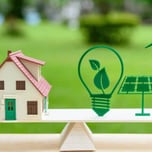Answer these simple questions and we will find you the BEST prices
Which type of solar quotes do you need?
It only takes 30 seconds
100% free with no obligation

Get up to 4 quotes from our selected suppliers by filling in only 1 form

Save money by comparing quotes and choosing the most competitive offer

Our service is 100% free and with no obligation
- GreenMatch
- Green Energy
Green Energy

What Is Green Energy?
Green energy, also referred to as clean energy, is produced by sustainable sources that do not emit carbon dioxide upon energy generation. Sun, wind, and water have been known and used to generate energy for many centuries.
Geothermal power is one of the oldest renewable sources, but it wasn’t until the 1970s that heat pumps become more popular in residential heating and cooling. In more recent years, solar panels have been growing in popularity ever since they hit the market in 2005 as more versatile green electricity option.
Regardless, fossil fuels such as coal and oil dominated the market for hundreds of years. Now, renewable energy sources are catching up as we have more advanced technologies to capture and keep the energy. Decreased costs expand the commercial market of green energy and make renewables widely accessible.
Nevertheless, with the rapid changes in our climate, in order to hit the global goal of reduced carbon emissions by 80%, ban on future fossil projects need to be more strict. In the UK, the renewable capacity is continuing to grow with plans for net zero carbon emissions.
If you're considering the installation of green energy technology, we can provide you with a service that is free of charge and without any obligation. You will receive up to 4 quotes from suppliers in your area to compare the best offers. Just fill in the form on the top of the page to request offers.
5 Green Energy Sources
Alternative energy sources are versatile and can be used for heating, cooling, and electricity. Variety of sources can be combined and support each other in order to provide stable and reliable energy supply.
Solar Energy

Converting sunlight into solar energy by using solar panels. As solar is quite developed on the market, there are two technologies to produce solar energy. One is produced by the Sun’s light, called photovoltaic energy, and it’s directly converted into electricity. The second one, solar thermal, uses the warmth of the sun to heat up water, using mirror or panel collectors.
One advantage of solar is that it can meet smaller domestic needs, such as roof solar panels. However, the growing demand for energy, the solar business has seen a rapid growth in capacity. One of the drawbacks of large scale solar farms, however, is that they require a lot of land.
Biomass Energy

Biomass energy is derived from organic material from plants or animals that contains energy stored from the sun. This material can be burned directly or transformed into biofuels or biogas. Solid biomass, such as wood and wood chips, can be burned in a wood pellet boiler to produce energy.
Food waste, paper, and landfill decompose and can be used to produce ethanol, whilst the process of producing biogas through food scraps and animal waste, is called anaerobic digestion. On a domestic scale, biomass boilers are an energy and cost efficient option that is growing in popularity for UK households.
Geothermal Energy

Used for heating and cooling, geothermal power uses heat derived from the Earth. Heat pumps for domestic use are a great alternative source of energy and types include: ground source heat pumps, air source heat pumps, and water source heat pumps.
There are three types of geothermal energy: dry steam, binary, and flash. Geothermal energy is slightly limiting for regions that are not naturally enhanced with geothermal.
The most-widely developed hydrothermal plants are located near geologic hotspots. In other areas, dry steam geothermal energy is used, which involves drilling into the Earth. Deep drilling for enhanced geothermal power may increase the risk of small earthquakes.
Hydropower

Also known as hydroelectricity, converts flowing water into energy. Man-made dams have been developed to capture the energy from moving water, and have made strides in the production of renewable energy.
In comparison to wind or solar power, generating electricity from hydro is not weather, nor time dependent. Hydropower can be stored in large quantities without wasting the energy, and can be fed to the grid when needed.
Wind Power

This is energy that uses wind or air flows in the atmosphere to generate electricity or mechanical power. The machinery used to harvest the wind and convert it into energy are called turbines, that could be placed both on land (Onshore), or in the sea or freshwater (Offshore).
Wind power is the most reliable source in the UK, with a large number of wind farms across the country, and as a result, is also the most cost-effective source of alternative energy. Offshore wind farms, although less popular and are currently still developing, have tremendous potential for supplying green energy to the mix.
As scientists and governments are looking for ways to reduce our carbon footprint, the business in renewable energy is expanding. Innovations in technology and alternatives for better ways to store the energy are emerging with better green energy options on the market.
What Are the Benefits of Green Energy?
Generating energy from renewable sources is central to the shift to a greener future. Undoubtedly, there are numerous benefits to green energy. There are many reasons to embrace the production of green energy.
Green energy has transformative powers for our planet, because:
- The energy sector is already transforming with off-grid solutions for locally-sourced energy.
- Renewable sources such as wind, sun, and water are not likely to diminish and are naturally replenished.
- Green sources generate electricity without producing harmful emissions and thereby reduce air pollution.
- New job opportunities within the sector arise through green technology development.

How Green Is the UK?
The electricity sector is the easiest step towards mass adoption of renewables. For the first time since the Industrial Revolution, a third of the UK's electricity was obtained from zero and low-carbon sources.
Wind farms generated about half of that energy, and in the future, onshore and offshore wind power will play a crucial role in the shift to net zero Britain.
Solar power supplied 5.2 TWh of energy, and with the changes in the climate systems across the country, the adoption of this source of energy is on a record high. UK’s growth in low-carbon sources also include biomass burning — making the UK the biggest importer of wood and pellets.
However, as projections for biomass energy demand promises a growth, the use of bioenergy is controversial, as biomass combustion is considered to have worse carbon footprint than coal.
Green Energy Suppliers
Green energy options vary in prices and tariff plans. The energy market is still dominated by fossil fuels, but fortunately, technologies are advancing and renewable energy is becoming cheaper as the demand and investments grow. Finding the best green energy supplier depends on the energy needs and the right tariff.
In the UK, there are six suppliers that supply gas and electricity to most of the country, known as the Big Six. These are British Gas, EDF Energy, Eon, Npower, Scottish Power, and SSE.






What is Green Gas?
Also known as biomethane, green gas is made from biodegradable materials through anaerobic digestion. The material, which is often food or farm waste, is then purified and supplied to the grid. Although many UK energy companies supply renewable energy, biomethane is rarely offered.
In an attempt by the government to expand the gas and electricity market, smaller green energy suppliers often provide the cheapest tariff plans. This is made possible because suppliers with less than 250,000 customers are exempt from the Energy Company Obligation. Smaller budget companies like Bulb and Good Energy are two small suppliers that also offer green gas in their tariff plans.
Considering the expensive cost of producing green gas, only a small number of suppliers provide it in their energy mix. Green Energy offers both 100% renewable energy and green gas in the UK.
The UK energy regulator Ofgem has enforced rules that give customers who are scared of switching to a smaller business more security. In case a supplier goes out of business, affected customers will be immediately transferred to a new energy company.
It’s worth mentioning that companies are obliged to list their energy mix on their website so you can see how much green energy they provide before transferring.
Can I Save With Renewables?
The UK government is encouraging the use of green energy by providing renewable energy funding, both on a domestic and non-domestic level. Most public funding options are available for both corporations looking to adopt green energy, as well as regular UK households.
You can read more about financial support schemes and green energy grants, like the boiler grant, below.
Smart Export Guarantee
From 1 January 2020, the Smart Export Guarantee (SEG) obligates licensed energy suppliers to offer payments to small scale renewable producers that export energy to the National Grid.
Mid to large scale suppliers will be required to offer at least one SEG tariff. It will apply for any of the following technologies:
- Hydro
- Anaerobic Digestion
- Solar PV
- Wind
- Micro combined heat and power
Smart Export Guarantee is a necessary step taken by the government after the closure of the Feed-in-Tariff for new applicants since April 2019.
Feed-in-Tariff
In 2010, the Feed-in Tariff (FiT) scheme launched in order to increase the uptake of renewable and low carbon technologies. The scheme applies to installation of up to 5mW in total.
The FIT offers quarterly payments within 20 years for the produced and generated energy, made by licensed suppliers.
The FIT was a very popular type of solar panel grant and made solar energy more accessible to households. This led to the closure of the FIT in April 2019, as the government announced that this green energy technology has now become affordable for the public.
Those that are already registered under the FIT scheme continue to receive payments for their solar PV installation until their agreement has reached its end.
The Renewable Heat Incentive
The Renewable Heat Incentive is a scheme that aims to help customers who wish to use renewable energy sources instead of traditional sources. It opened as a green funding solution for the commercial sector at first, but later on it was also introduced for domestic applicants.
Requirements for eligible technologies and specific types and sizes may vary for each scheme. There are some things to consider before applying in order to calculate the RHI value. Approved green energy equipment include:
- Ground source heat pump
- Air source heat pump
- Biomass type boiler
- Solar Thermal
There are two RHI schemes available - domestic and non-domestic installations in the business sector, schools, and non-governmental organisations.
Domestic RHI provides financial support for using renewable heating technology. Customers receive quarterly payments for seven years under the scheme. In order to qualify, one of the aforementioned technologies needs to be installed.
Non-domestic RHI is aimed to encourage the use of renewables in the public sector, industrial premises, and the business sector. Eligible customers receive financial support for 20 years and the tariff and amount of money (calculated per kilowatt hour) depends on the green energy technology.
The Energy Company Obligation
The Energy Company Obligation (ECO) is a governmental programme aimed to tackle energy efficiency and reduce fuel poverty. Energy suppliers who are part of the Home Heating Cost Reduction Obligation are obligated to provide low income and vulnerable households with improved measurements for home heating.
Customers who were denied an ECO grant before, now can be eligible for ECO3, which will run until 2022. This new version of the scheme is fully focused on low income families, with more flexible eligibility.
Green Energy Is the Future
Cheaper renewable energy generation and investments in innovations are bringing promises for greener future one step closer. Green energy technologies are on the rise and are suitable for households with various needs, making them increasingly common options for home improvements projects.
Should you wish to start using sustainable energy, GreenMatch can help you get familiar with the associated savings and assist with shifting to green energy.
Choosing the right green energy equipment for your household depends on factors such as home size and specific usage needs. We at GreenMatch can help you make the right decision! By filling in our contact form at the top of this page we will come back to you with up to 4 quotes from suppliers near you. The service is non-obligatory and free of charge!
Fill in the form in just 1 minute

Valli has been writing well researched articles about renewable energy, sustainability and green technologies for GreenMatch since 2017. Her work has been published in various media such as Entrepreneur, Business Insider, Canadian Geographic, uSwitch, and eCycle.
We strive to connect our customers with the right product and supplier. Would you like to be part of GreenMatch?





